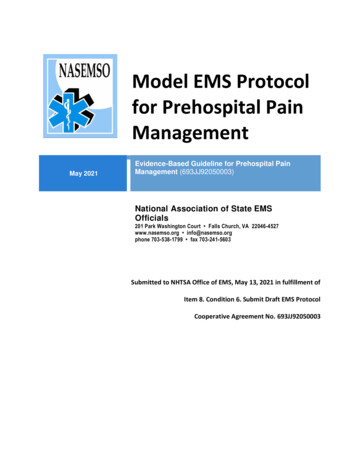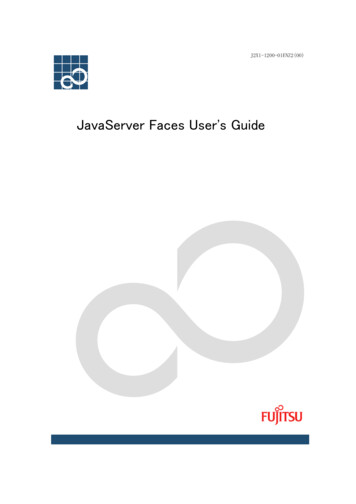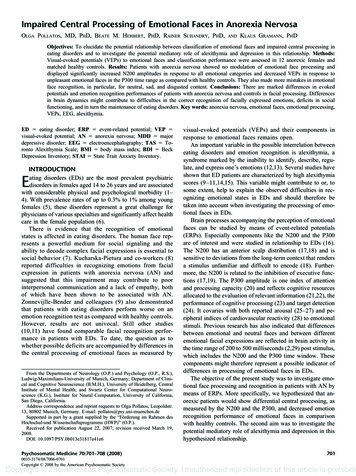
Transcription
International Journal of Role-Playing - Issue 1The Many Faces of Role-Playing GamesPopular Abstract - Role-playing games have evolved into many forms in their thirty-year history. From thetraditional pen-and-paper form, that originated with Dungeons and Dragons, with a group of friendsplaying around a table, to large live-action game, with hundreds of people acting out their assumed roles.The first computer role-playing games appeared over twenty-five years ago and massively multi-playerrole-playing games, such as World of Warcraft are now one of the most popular genres of digital games.Despite this diversity players at least seem to think they know when something is a role-playing game.When players, writers and game designers say “this is a role-playing game” there are no problems, theyall seem to know what each other means, what is and is not a role-playing game. Yet there is no commonlyaccepted definition of the form. Understandable, perhaps, given the diversity, but the implicit agreementabout its use means that there may well be some common underlying features shared by the variousexamples.Hampering any attempt to understand what makes a game a role-playing game is the subtledivide between role-playing and role-playing game. Role-playing can take in many places, not all of themgames (such as ritual, social activities, therapy, etc). This means that definitions of the role-playing activityare not that useful in separating role-playing games from other games. In this paper we start from theposition that the players are correct: they know what a role-playing game is. By examining a range of roleplaying games some common features of them emerge. This results in a definition that is more successfulthan previous ones at identifying both what is, and what is not, a role-playing game.Michael HitchensMacquarie ole-playing games have grown and evolved into alarge number of forms in the last thirty years,spanning digital as well as non-digital media.They demonstrate a wide variety in the number ofparticipants, style of play and the formal andinformal systems that govern them. Despite thisdiversity players at least seem to think they knowwhen something is a role-playing game. Yet there isno commonly accepted definition which bothcaptures games generally accepted as role-playinggames and distinguishes them from other, similar,games which begs the question, whether roleplaying games are united by anything more than acolloquial name. Additionally, research involvingthese games is hampered by lack of a widelyaccepted definition of what constitutes a roleplaying game, as it is then not even possible toclearly delineate the subject of such research. InAnders DrachenIT University of CopenhagenDenmarkdrachen@itu.dkthis paper various example of role-playing gameare examined in an attempt to identify the definingset of characteristics of these games. On that basisa definition for them is proposed which ishopefully more successful at separating roleplaying games from other, similar, game forms.1.INTRODUCTIONRole-playing games, in their modern form, aregenerally held to have originated with Dungeonsand Dragons in the 1970’s (Mason 2004). Since thenthey have evolved into a wide variety of styles andmedia, including both digital and non-digitalexamples and with player numbers in anindividual game ranging from a single person tothe thousands. The differences between theseforms can be so extensive that players of one maydismiss another as not being a role-playing game atall (Dormans 2006).3
International Journal of Role-Playing - Issue 1Take, as an example of both the similarities anddifferences, the current Dungeons and Dragons ruleset and its embodiment in the Neverwinter Nightsseries of computer games. The two have manyelements in common. They share a basic setting(the world of Neverwinter Nights being one of thepublished backgrounds of Dungeons and Dragons)and the mechanics of the digital game are a veryaccurate transfer of the non-digital rules into adigital form. They also differ in fundamental ways,the most obvious being the existence of a graphicalinterface for the computer game. Less obviously,Neverwinter Nights, in common with other digitalrole-playing games, is unbending in its applicationof the rules and outcomes. In a non-digital roleplaying game there is at least the opportunity forflexibility with (typically) a game master who canchoose which rules to use when and whether theresults of those rules are to be applied unaltered ormoderated in some form. More subjectively theremay be argument about whether the play of agiven game involves actual “role-playing” or not.The differences between role-playing game formsare not simply explained by the digital/non-digitaldivide. For example, “Pen and Paper” and “Liveaction role-play” are two categories often appliedto non-digital role-playing games. The formerusually consists of a small group sitting around atable, using verbal description for most of the gameplay, while the latter can consist of 1000’s ofplayers, using both verbal and physical enactiontechniques of game play. These are not the onlysub-categories that have been used in describingtypes of role-playing games, others include“freeform”, “tabletop”, “systemless” and“pervasive”. Whether these are truly separate anddistinct categories is debatable, but they all enjoysome colloquial use.Matching this wide variety, researchers haveapproached role-playing games from a number ofperspectives. Some have documented the history ofone or more forms of role-playing games, forexample Koster (2002), and Mason (MAS04).Mackay (2001) examined them from theperformance point of view. Copier (2005) relatesnon-digital role-playing games to their place in theDutch fantasy subculture and their relation toritual. It is also worth noting the use she makes ofrole-playing games in discussing the concept of the“magic circle”, an example of the study of roleplaying games being used to examine more generalgaming concepts. Fine (1983) uses a participantobservation approach to discuss them mainly inthe context of the interactions between the players.Montola (2007) describes the application of role-playing games in pervasive gaming format.Tychsen et al. (2007) examine the changes in playerenjoyment and engagement between some of thevarious forms of role-playing games. For Dormans(2006) they are an opportunity “to take sometheoretical concepts and notions developed forcomputer games and use them to study roleplaying games”.Outside the academic sphere, some members of therole-playing community itself have attempted toanalyse these games. Such self-examination hasbeen extensive, for example in the internet venuesof The Forge and RPGnet, but generally lacksconnections to wider game theory. It is worthnoting though, as Copier (2005, p.4) does that“Some researchers take part in both the academicand the player’s discourse on RPG theory”.Notable work originating from the role-playingcommunity includes discussions on game playstyle, for example (Hetland 2004) and (Edwards2001), and examination of the place of narrativeand story-telling in role-playing games, forexample (Henry 2003), (Kim 2003) and (Padol1996), amongst other topics.While all these studies, and others, are obviouslyhighly varied in their approach to role-playinggames, it is notable that they generally take acircumspect and/or highly inclusive approach todefining what it is they are discussing. It is bothinteresting and understandable that many authorsdealing with role-playing games shy away fromthe question of defining exactly what a role-playinggame is. For example, while Copier (2005) offerssome discussion of the forms of in which roleplaying games exist, the activities involved and therelation between role-playing games and wellknown definitions of games in general, she doesnot tackle the question of exactly what is a roleplaying game. Instead, the section in her paperentitled “Role-Playing Games” deals with theirhistory, the demographics of Dutch players and thehistory of the study of role-playing games, withouttouching on exactly what a role-playing is.Many authors that do address the question positdeliberately wide definitions. They may define theact of role-playing (as opposed to a role-playinggame). Typical of these is (Henriksen 2002, p.44):“[role-play is] a media, where a person,through immersion into a role and the worldof this role, is given the opportunity toparticipate in and interact with the contentsof this world.”A more extreme example is that of Pettersson (2006,p.101), for whom “roleplaying is the art of4
International Journal of Role-Playing - Issue 1experience, and making a roleplaying game meanscreating experiences”. As noted by Stenros andHakkarainen (2003, p.61) many existing definitionsof role-playing and role-playing games “have beenlargely normative, not descriptive”. This is not tosay that such efforts are without value. The roleplaying experience is undoubtedly one in whichimmersion, the assumption of a role and theinvolvement of the player are central. The playerexperience is, however, not the same as the activityin which they partake.Some authors have taken a more descriptivestandpoint, for example (Stenros & Hakkarainen2003, p.56):“A role-playing game is what is created inthe interaction between players or betweenplayer(s) and gamemaster(s) within aspecified diegetic framework. [A] roleplaying game requires four things, agamemaster, a player, interaction, and adiegetic framework.”Again, this is a rather broad approach to thequestion. Many games not normally consideredrole-playing games are covered by it and similardefinitions. This arises from the focus of theauthors, which can be seen in their statement “Wehave created a model that includes all activitiesthat we recognize as role-playing”. Note that theyrefer to role-playing, not role-playing games. Whilethis inclusivity is commendable when it comes tounderstanding the general activity of role-playing,it does not help in separating role-playing gamesfrom other game types. The same paper, forexample, discusses the possibilities of role-playingin Risk and Monopoly, games not generallyregarded as role-playing games.It could even be argued that, given the extremevariety of form displayed by role-playing games,touched on above, and the possibilities for roleplaying outside of role-playing games, that ageneral definition can either not be arrived at orwould be too vague to be useful. However, theextensive use made of the term “role-playinggames” by these authors, and many others, impliesthat it refers to something and that a potentiallyidentifiable object, the role-playing game, exists.Otherwise the use of the term could only beconsidered confusing at best. As discussed belowthese proposed definitions have significantshortcomings.That a certain type of game exists which can belabelled “role-playing game” is implied by thewidespread use of the term. Players appear tobelieve they know whether or not a game is a role-playing game. If the accuracy of suchidentifications is accepted then a definition of arole-playing game may perhaps be arrived at byanalysis of the different forms in an attempt toidentify the common features, if any. It is alsoimportant to note that role-playing exists outsiderole-playing games – in various social and culturalarenas, in education, training, etc. The broaderactivity of role-playing is not the topic beingdiscussed here, instead what is examined is thegroup of games collectively, and colloquially,termed role-playing games. Whether any of thesegames involve actual “role-playing” is anotherquestion, as, in many cases, identifying roleplaying is extremely subjective and notoriouslydifficult to achieve agreement about.The topic of this paper is role-playing games, notrole-playing. Significant discussions exist of therole-playing activity, both in gaming and nongaming spheres. But as role-playing does not needa gaming context in which to exist, definitions ofrole-playing do not provide a conclusive answer towhat constitutes a role-playing game. This paperaddresses the latter question be examining thenature of those games, which provide the contextfor the role-playing that occurs within them.2. EXISTING DEFINITIONS OF ROLEPLAYING AND ROLE-PLAYING GAMESAs noted above there have been a number ofattempts at defining role-playing and/or roleplaying games. While they are, understandably,varied, they can be (roughly) divided into twobroad categories – those which focus on the processand experience of role-playing and those whichinclude descriptive elements about the game andgame-play itself. These, to an extent, correspond tothe normative and descriptive categories identifiedby Stenros and Hakkarainen (2003), although someof the definitions contain elements of both andtheir placement here into one of the two categoriesmay be considered arbitrary. Such placement is notintended to be definitive, but instead a means ofdiscussing current efforts at definitions. Whilespace prohibits an exhaustive examination of thedefinitions offered in the literature, it is worthreviewing a (hopefully) representative sample.2.1 Process and Experience Based DefinitionsOne of the earliest definitions of role-playing, froma time when even many role-playing gamesthemselves did not address the question, is that ofLortz (1979), who defines a role-playing game as“any game which allows a number of players to5
International Journal of Role-Playing - Issue 1assume the roles of imaginary characters andoperate with some degree of freedom in animaginary environment”. The emphasis here onplayers assuming roles and the freedom withwhich they interact with the game world is a themethat later writers would return to in more detail.While it places the player and their experience atthe centre of the role-playing activity it onlyconveys a sketchy impression at best of the gamesthemselves.This tendency can also be seen in (Padol 1996)where a role-playing game is defined as one that“Allows people to become simultaneously both theartists who create a story and the audience whowatches the story unfold. This story has thepotential to become a personal myth, shaped tomeet the needs of its creators.” This is an attractivedefinition, at least to those who wish theircharacters to experience interesting stories (whichis at the very least a significant minority of roleplayers) and conveys a useful perspective on therole-playing experience. Its emphasis on story,which is clearly seen by the author as somethingcreated in the role-playing activity, but not as thewhole of that activity itself, does not tell us a greatdeal about the context in which those stories arecreated. Read literally, any game with storyelements where the participants have some inputinto the unfolding of that story, could be said to fitwithin this definition. It is doubtful that such asimple-minded interpretation is intended, andinstead there appears to be an implicit assumptionabout what a role-playing game is, the definitiontelling us more about what happens in such agame. Its usefulness in separating role-playinggames from other game types, on a structural ordescriptive basis, is therefore limited.A more general definition, without the emphasis onstory, is that of Henriksen (2002), quoted above.Again, this sidesteps the question of the means bywhich and limitations upon the interaction that theplayers have with the game world occurs. Thisshould not be seen as a particular criticism, as roleplaying, not role-playing games, are being defined.Role-playing can, and does, occur outside of roleplaying games.¹ In fact, one of the earliestdefinitions of role-playing pre-dates role-playinggames by about two decades, that of Mann (1956, p.227):“A role-playing situation is here defined as asituation in which an individual is explicitlyasked to take a role not normally his own, orif his own in a setting not normal for theenactment of the role.”As these definitions are not directly addressingrole-playing games it is understandable they havelimited utility in identifying such games.One similar definition which does mention gamesis that of Montola (2007, p.179). Again the attemptis not to define role-playing games, but to offer adefinition of the role-playing activity (italics as inoriginal):“I see roleplaying as an interactive process ofdefining and re-defining an imaginary gameworld, done by a group of participantsaccording to a recognised structure of power.One or more or participants are players, whoportray anthropomorphic characters that delimitthe players’ power to define.”While it is almost certainly unfair, given its statedintention, we can examine how useful thisdefinition is in explicitly categorising role-playinggames; the word “game” is, after all, included. An“interactive process of defining and re-defining animaginary game world” could apply to any game,as any game, even the most abstract, has a gameworld which the participants alter through theirgame play. The phrase “recognised structure ofpower” is likely meant to refer to the game masterfunction and the variety of forms that can take, butdoes not define how power within the game isstructured or how it is recognised or indeedwhether the power structure may or may not beegalitarian. It should also be noted that softwareand a player could be considered to form a groupof participants, with a power structure, so thiscovers all digital games. This definition could thencover a range of digital games, for example firstperson shooters and three-dimensional platformgames, as well as board games such as Talisman andSquad Leader which represent individual characterswithin the game. It is not likely that this is actuallyintended and again this definition has much moreto say about the role-playing process than roleplaying games.There are other definitions which fit broadly withinthe category discussed here. For example, that ofPettersson (2006) (quoted above), Pohjola (2004, p.89): “Role-playing is immediated characterimmersion”, Pohjola (2003, p.34): “Role-playing isimmersion to an outside consciousness (“acharacter”) and interacting with its surroundings”,Mäkelä et al. (2005, p.207) “role-playing is defined¹ Indeed, it is debatable whether a role-playing game has to involve role-playing at all.6
International Journal of Role-Playing - Issue 1as any act in which an imaginary reality isconcurrently created, added to and observed” andEdwards (2001), which discuss the requirementsfor the role-playing activity rather than thedefinition of a role-playing game.It should be noted that in all these definitions it isrole-playing, not role-playing games, whichoccupies the central position. It is understandablethen that, while valuable within their chosen scope,they are less useful when it comes to identifyingrole-playing games as a separate category. As notedin several of them the act of role-playing may occurin a wide range of venues, including games notrecognised as role-playing games and even outsidea gaming context altogether.As the focus of the current paper is to arrive at adefinition that can identify role-playing games as acategory within the broad spectrum of games, noton the role-playing experience, we need to considerother approaches.2.2 Descriptive Based DefinitionsThere have been fewer attempts at descriptivedefinitions of role-playing games then those of thetype discussed above. However, a number do exist.Dormans (2006) gives a definition of role-playinggames by categorising them into four types, penand-paper, live-action, computer and massivelymultiplayer, ostensibly on the basis of “medium,means and scale”. However, on examination thedifferences between the categories offered areactually only on medium (pen-and-paper, liveaction and computer) and scale (pen-and-paperand computer versus live-action and massivelymultiplayer). It would be difficult to argue againstthe proposition that many examples of role-playinggames fall into one or another of these categories.However, the proposition that these categories aresufficient is more contentious. There is, forexample, an implicit assumption aboutquantitative measurement and random resolutionunderlying the arguments presented. This can evenbe seen even in the article title, which begins “Onthe Role of the Die” and in the early statement “Iwill try to expose the role played by dice in thesegames”. Role-playing games exist which do notrequire random quantitative resolution. In fact,some do not require quantitative elements at all.This is not a reference to the Amber diceless systemor similar rulesets which involve quantitativeassessment of character skills and abilities but notrandom resolution. A form of role-playing gamewhich does not fit any of Dorman’s categories isthat known in Australian hobby role-playingconventions as “systemless”. That this form,described below, exists invalidates Dorman’s fourcategories as a complete definition of role-playinggames. More fundamentally, Dorman’scategorisation has limited usefulness as a completedefinition, as no attempt is made to analyse theforms to discover if there is any underlyingcommonality which could both group themtogether and separate them from other game types.If there are forms of role-playing game beyond isfour categories no guide is given as to how toidentify them. The definition therefore relies uponits own a priori completeness.Tychsen et al. (2006) provides a detailed analysis ofmulti-player tabletop and digital role-playinggames, comparing the two forms. The analysisdescribes both the process-aspects of play, as wellas providing an overview of the features sharedbetween role-playing games in general. Whilefairly detailed, the discussion is explicitly stated asnot being complete. The reader is referred there forthe complete overview of the analysis, but insummary it states that role-playing games all sharethe following features: At the heart of role-playing games, there isan element of “storytelling with rules”, andeach game form provides unique ways ofexpressing this feature. Rules, multiple (at least two) participantsand is set in a fictional world, establishedvia the game premise: A sharedunderstanding among the participants ofthe game setting, rules and similar gameframework issues. Most of the game participants normallycontrol a character through which theyinteract with the fictional world There is usually a game master (or digitalsystem performing a similar function)responsible for management of thoseelements of the game and fictional worldoutside direct control of the players.Tychsen et al. (2006) also discuss the functions ofthe game master and mention that the role of thegame master may not be fixed, but move amongstthe participants, and varies greatly in functionalityacross role-playing game forms.The problem with the list of shared features inTychsen et al. (2006) is that it appears to covergames which are not normally considered roleplaying games. If it is allowed that some digitalgames are role-playing games (which the authorsof the current paper do) then consider the firstperson shooter. Once role-playing games7
International Journal of Role-Playing - Issue 1are allowed to be digital than it must also befurther allowed that software may take on the roleof the game master. When looking at the list above,it would appear that e.g. first-person shooterswould be considered role-playing games. Theyhave a fictional world, multiple participants (atleast one player and the game master/software)and a character through whom the player interactswith the game world. First-person shooters couldalso be argued to contain or create stories duringplay, notably games that specifically aim at creatingan interesting storyline, e.g. Deus Ex, System ShockII and Bioshock.It could be argued that the player does not roleplay a character in a classical FPS-style digitalgame, however, it is important to note that theplayer does have the potential role-play thecharacter – but there would not be an in-gameeffect of this role-playing (except potentially inaffecting some of the choices the player makes).Many contemporary FPS-games include featuresfor solving conflicts in different ways – e.g. violentvs. non-violent solutions to problems in Bioshock orCrysis. It could be argued that this provides a lowlevel form of role-playing potential to these games.Yet such games, with a few exceptions, are rarelyconsidered or termed role-playing games. Some,such as Deus Ex, are said to have role-playingelements, but that is not the same as being a roleplaying game. Another game type that could beargued to feature the same series of elements arethe three-dimensional platform games, such as Jakand Daxter and Ratchet and Clank, which again arenot typically considered role-playing games.Finally, Tychsen et al. (2006) point to theimportance of the role-playing element of roleplaying games, but also note that contrary to thename, the act of role-playing is not a feature foundin all the games popularly titled role-playinggames. For example, digital role-playing gamesoften feature a comparatively limited ability for theplayer to role-play their character. The authors donot however provide a definition of when a playercan be said to be role-playing or not.An essentially similar, if less detailed, definition isgiven by Morgan (2002), which in summary, statesthat players deal with an imaginary world, throughthe medium of a character, and that there is a gamemaster who: “adjudicates rules disputes”; and:“guide[s] play much as a director would a movie”.It can be seen to also be problematic in terms ofidentifying what and is not a role-playing game asit what it covers conflicts with the generallyaccepted usage of the term.A slightly different approach is taken Mackay(2001, p. 4) who defines role-playing games asfollows (italics as in original):“[A]n episodic and participatory story-creationsystem that includes a set of quantified rulesthat assist a group of players and agamemaster in determining how their fictionalcharacters’ spontaneous interactions areresolved.”It does not mention a fictional world and focuseson story-creation and interaction. It requiresquantified rules, which were noted above to beunnecessary. Again, whole classes of digital gamesnot recognised as role-playing games fit thedefinition. It could also be asked why the gamemust be “episodic”. Many examples of shortgames, which can be completed in a single session,are known, particularly at non-digital role-playingconventions. The prominence given to “storycreation” is also debatable, given the argumentsaround the place of story and narrative withingames.Another, often referenced, definition of a roleplaying game is that of Stenros and Hakkarainen(2003), quoted above. In common with some of theother definitions discussed here it mentionsplayers, game masters and interaction. However iteschews mention of a game world in favour of“diegetic framework”, which includes the gameworld.² The concept of diegesis is an extremelyuseful in understanding what is happening withina role-playing setting and how players approachthe act of role-playing. However, as it can applygenerally to any game form it is less useful inseparating out role-playing games.Even the more detailed of the above definitionsreduce to a game, set in an imaginary world,played by multiple participants, one or more ofwhom has a special role, commonly termed thegame master, who controls aspects of the gameworld outside the control of the remainder of theparticipants, who typically control one or morecharacters. The presence of a privileged participantwho controls aspects of the game world is hardlyan identifying element of role-playing games. Aswell as the digital game forms mentioned aboveconsider for example, referees in competition figuregaming, who may create the terrain upon whichbattles are fought (i.e, the game world), interpretrules issues and occasionally adjudicate outcomes.² In the words of [Ste03] “Diegesis is what is true within the game world”8
International Journal of Role-Playing - Issue 1This appears to meet the minimum requirements ofa game master, yet such games are not consideredrole-playing games. Interestingly, though, it wasfrom such games that the original table-top roleplaying game, Dungeons and Dragons, was derived.Which perhaps goes some way to proving therelationship between the role-playing game masterand the figure gaming competition referee and thatthe mere presence of such a participant is notenough to make a game a role-playing game.Most, and arguably all, of the definitions discussedin this section are successful in that the gamescommonly termed role-playing games meet theirrequirements. Unfortunately, despite theirrespective advantages, they are insufficientlyprecise for use in deciding which games are roleplaying ones and which are not as they alsoinclude within their scope games which aregenerally not considered to be role-playing games(or, in the case of Dormans (2006) do not covergames which are and give no guidelines forconsidering undecided cases).3. ROLE-PLAYING GAME FORMSFrom the above discussion it can be seen that wedo not currently have a definition of a role-playinggame (as opposed to the role-playing activity) thatboth includes the set of games commonlydescribed as role-playing games, while at the sametime separating them out from other game forms.As this has not been the intent of the work cited inthe above, this should not be taken as criticism.However, attempting such a definition is useful asit offers a different perspective on role-playing thanthat offered by previous authors.The concept of diegesis is extremelyuseful in understanding what ishappening within a role-playingsetting and how players approach theact of role-playing. However, as it canapply generally to any game form it isless useful in separating outrole-playing games.A def
position that the players are correct: they know what a role-playing game is. By examining a range of role-playing games some common features of them emerge. This results in a definition that is more successful than previous ones at identifying both what is, and what is not, a role-playing game. International Journal of Role-Playing - Issue 1










